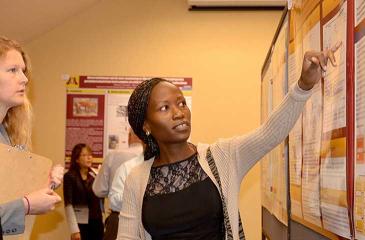Education and Training

A central focus of IMV is to enhance training and professional development of student and early-career scientists, including junior faculty.
Interdisciplinary and interprofessional training and mentoring is a highlight of IMV.
Learn more: IMV Training Program | Courses | Calendar of Events

IMV Training Program
Training and mentoring of PhD and dual degree DDS-PhD, DVM-PhD and MD-PhD students in various PhD majors have formed the cornerstone for the IMV Training Program, which is a NIH T32-supported program that supports predoctoral students pursuing Ph.D. degrees. The training program has gained support from the UMN’s Graduate School through the creation of the “Interdisciplinary Studies in Virus Research” graduate group, which is intended to further enhance the interdisciplinary nature of the IMV’s educational mission.
Courses
Undergraduate Spring 2022
MICB 4171: Biology, Genetics, and Pathogenesis of Viruses. 3 credits.
MICB 4235: Advanced Laboratory: Virology, Immunology, and Microbial Genetics: Techniques, experimental methods in microbial genetics, immunology. Virology used to study microbes/inteactions with host. 3 credits.
CFAN 3334: Parasites and Pestilence. 3 credits. Aliota. Spring Semesters, MWF 10:10-11:00am.
Graduate Courses Spring 2022
CMB 5201: Stopping the Next Pandemic: Vaccines and drugs for battling viral infections. 2 credits. Course coordinator Fang Li. Insturctors Fang Li, Yuying Liang. Spring Semester, Mondays 10am-12pm. St. Paul Campus.
VIRO/OBIO 5030: Virology Research Presentations: Virology through research presentations as well as the critical evaluation of presentations of other students and researchers.. 1 credit.
VIRO/OBIO 8010: Molecular Virology. 2 credits.
VIRO/OBIO 8020: Virus Pathogenesis and Host Interactions: Molecular, cellular, and organismal aspects of virus pathogenesis and host interactions. 2 credits.
VIRO/OBIO 8050: Evolution of Emerging Viruses: how HIV and other emerging viruses (e.g., Ebola, influenza, SARS, West Nile virus, hantavirus, hepatitis C) evolve and become public health threats. 2 credits.
MICA 8002: Structure, Function, and Genetics of Bacteria and Viruses. 4 credits.
MICA 8004: Cellular and Cancer Biology. 4 credits.